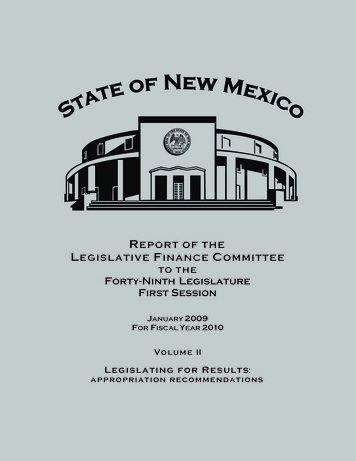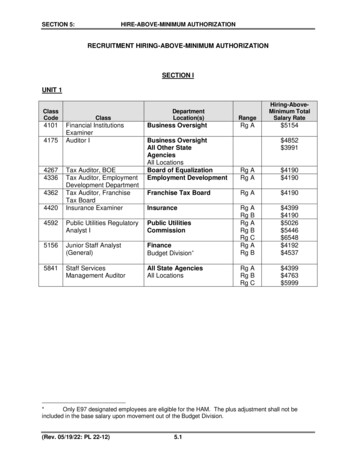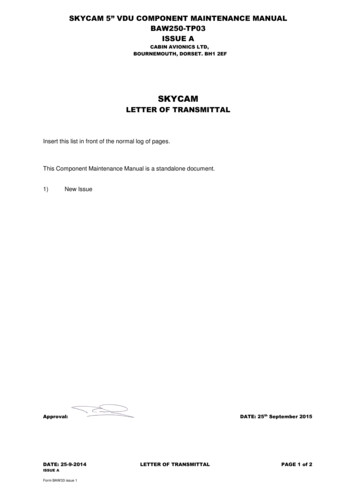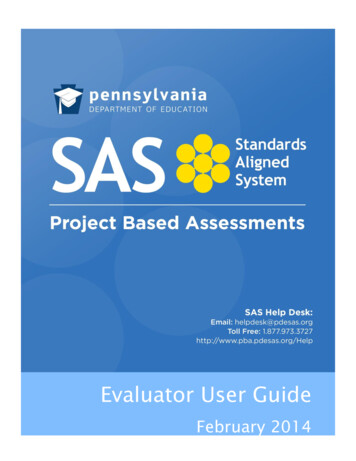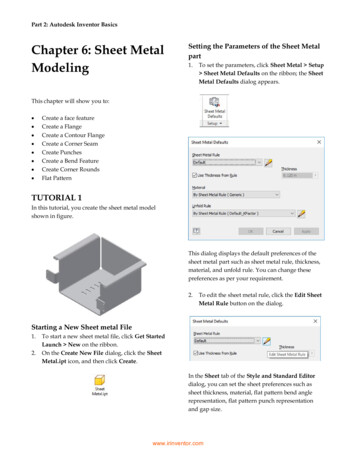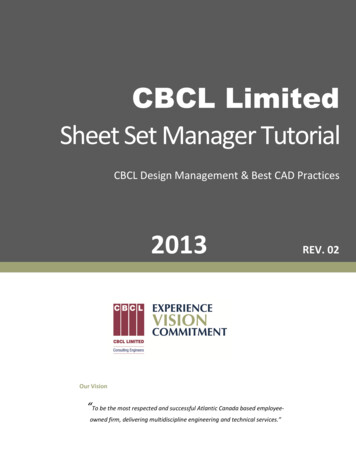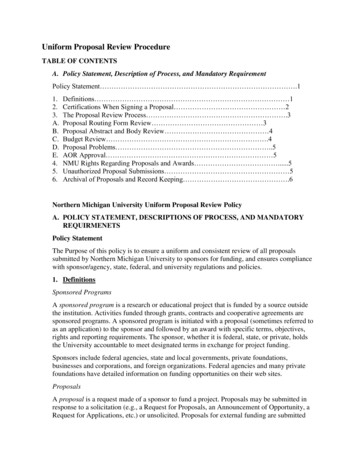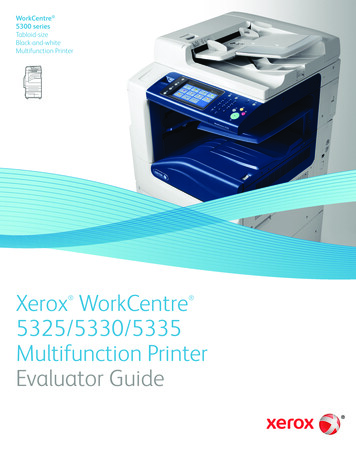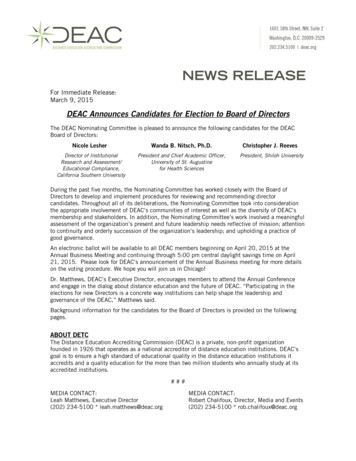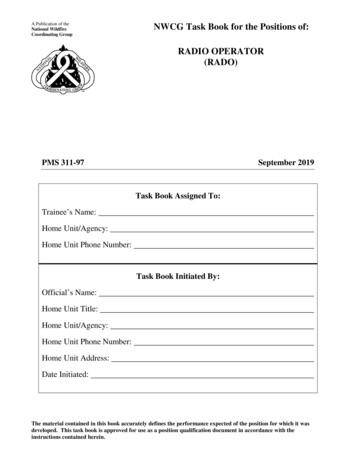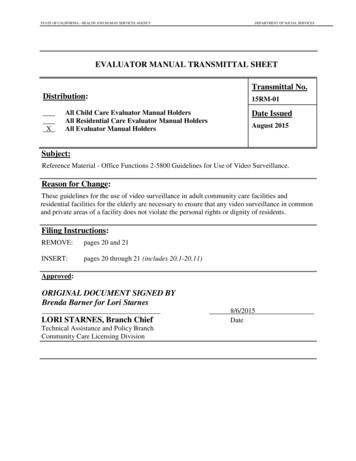
Transcription
STATE OF CALIFORNIA - HEALTH AND HUMAN SERVICES AGENCYDEPARTMENT OF SOCIAL SERVICESEVALUATOR MANUAL TRANSMITTAL SHEETTransmittal No.Distribution:XAll Child Care Evaluator Manual HoldersAll Residential Care Evaluator Manual HoldersAll Evaluator Manual Holders15RM-01Date IssuedAugust 2015Subject:Reference Material - Office Functions 2-5800 Guidelines for Use of Video Surveillance.Reason for Change:These guidelines for the use of video surveillance in adult community care facilities andresidential facilities for the elderly are necessary to ensure that any video surveillance in commonand private areas of a facility does not violate the personal rights or dignity of residents.Filing Instructions:REMOVE:pages 20 and 21INSERT:pages 20 through 21 (includes 20.1-20.11)Approved:ORIGINAL DOCUMENT SIGNED BYBrenda Barner for Lori StarnesLORI STARNES, Branch ChiefTechnical Assistance and Policy BranchCommunity Care Licensing Division8/6/2015Date
EVALUATOR MANUALOFFICE FUNCTIONSTABLE OF CONTENTSOFFICE FUNCTIONS .2-0000General Statement .2-0010Accountability, Record Keeping and Reports .2-1000Itineraries .2-1100Fire Clearance Documentation.2-1115Fire Clearance Sample Letters.2-1116Consultants.2-2000Medical Exams for Victims of Abuse who are Medically Indigent .2-2100Communications – Roles and Responsibilities .2-3000Written Communication.2-3100Memoranda .2-3120Other Documents used in WrittenCommunication to Applicant/Licensee .2-3130Facility Files.2-3150“Facility File” Retention/Disposal .2-3151“Facility Closure” Facility Records .2-3152Meetings with Local Agencies.2-3200Legislative Contacts .2-3310Media Contacts .2-3320Departmental Litigation .2-3400Criminal Record Clearance (Repealed 6-1-00).2-4000 – 2-4900Waivers and Exceptions .2-5000Guidelines for Evaluating Requests .2-5100Waiver vs. Exception .2-5200Considering Requests.2-5300Dos and Do Nots for Evaluating Requests .2-5310Developing the Request .2-5400Evaluating the Request .2-5500Other Reasons for Denial .2-5510Preparation of Waiver Exception .2-5600Re-evaluation of Waiver/Exception .2-5700Guidelines for Use of Video Surveillance 2-5800Public, Personal and Confidential Information .2-6000Requests to Review Information .2-6100Requests for Information Relative to Residential Care FacilitiesFor the Elderly .2-6110Requests for Information Relative to Children’s ResidentialFacilities and Adult Residential Facilities .2-6120Requests for Information Relative to Child Care Facilities .2-6150Restrictions Relative to Foster Family Homesand Family Child Care Homes .2-6200Sample Notice .2-6210Public Information .2-6300Personal Information .2-640015RM-01August 20151
EVALUATOR MANUAL2-5700OFFICE FUNCTIONSRE-EVALUATION OF WAIVER/EXCEPTION2-5700Licensing Program Analysts should review waiver(s)/exception(s) prior to annualinspection or as often as necessary to insure that safe and adequate care is provided toclient(s)/resident(s).During the site visit, document on the Licensing Report (LIC 809) whether the conditionsof the waiver/exception request have or have not been met. Depending upon the reevaluation, the waiver/exception may be extended or terminated. If no significantchanges have occurred in the circumstances or conditions of the currently approvedwaiver/exception, indicate this on the LIC 809. If the waiver/exception will be extended,the extension date shall be specified on the LIC 809. In most cases it should not benecessary to issue a new waiver/exception form but if circumstances have changed or ifadditional conditions should be imposed it may be necessary to complete a newdocument.2-5800GUIDELINES FOR USE OF VIDEO SURVEILLANCE2-5800Use of video surveillance in adult community care facilities and residential facilities for theelderly is not directly addressed in Title 22 regulations. However, clients maintain privacy anddignity rights that can be violated by negligent and/or abusive surveillance practices. Thefollowing guidelines are provided to help ensure that any video surveillance in common andprivate areas does not violate the personal rights of clients. Under no circumstances may videosurveillance in facilities use an audio component.A Licensee that has been using video surveillance prior to 2015 must contact his or her LicensingProgram Analyst to develop a plan that brings the facility into compliance with the guidelinesestablished in this policy for the use of video surveillance.GUIDELINESThere are specific components that should be completed by the licensee and submitted to theDepartment. The components are as follows: Waiver Requesto A waiver of the right to privacy is not required for common areas that are readily viewable andaccessible by the public (e.g. on a driveway clearly open to public viewing or an entrance or exitthat is publicly accessible).o A waiver is required for private areas of a facility.o All relevant Title 22 regulations to be waived are listed on the request.o The potential regulations that the licensee might request to be waived are provided, below, inTable 1A (General Licensing), Table 1B (Adult Day Programs), Table 1C (ResidentialFacilities for the Elderly) and Table 1D (Residential Care Facilities for the Chronically Ill).15RM-01August 201520
EVALUATOR MANUAL2-5800ooOFFICE FUNCTIONSGUIDELINES FOR USE OF VIDEO SURVEILLANCE (Continued) 2-5800Note: For each regulation waived, the licensee must be clear the waiver is strictly related to thevideo surveillance, (i.e. a resident does not waive his/her right to other aspects of the regulation).For example, a waiver of Title 22, Section 87468(a)(1) does not mean the resident is waivinghis/her right to dignity in relations with staff, etc. The waiver request would provide explanationof how the waived regulations are limited to the use of video surveillance and the resident wouldonly be waiving his/her right to privacy based on the specified use and purposes of videosurveillance as defined in the updated Plan of Operation with a documented statement ofinformed consent.The following are the applicable Waiver and Exceptions regulations in the California Code ofRegulations, Title 22: 80024 Waivers and Exceptions - General Licensing regulations (Adult Residential Facilities,Adult Residential Facilities for Persons with Special Health Care Needs and SocialRehabilitation Facilities) 82024 Waivers and Exceptions - Adult Day Program regulations 87209 Program Flexibility - Residential Care Facilities for the Elderly regulations 87824 Waivers and Exceptions - Residential Care Facilities for the Chronically Ill regulations Updated Plan of Operationo Licensee must submit an updated Plan of Operation.o Table 2 provides a general outline for how a Licensee may update their Plan of Operation.o Licensee must be in compliance with applicable Title 22 regulations, as specified in the followingSections: 80022 Plan of Operation - General Licensing regulations (Adult Residential Facilities, AdultResidential Facility for Persons with Special Health Care Need and Social RehabilitationFacilities). In addition to Section 80022, the following shall apply: 81022 Plan of Operation - Social Rehabilitation Facilities regulations 85022 Plan of Operation - Adult Residential Facilities regulations 82022 Plan of Operation - Adult Day Program regulations 87209 Program Flexibility - Residential Care Facilities for the Elderly regulations 87822 Plan of Operation - Residential Care Facilities for the Chronically Ill regulations Updated Admission Agreement and Informed Consento The California Department of Social Services (CDSS) shall apply the following definition of“informed consent” when reviewing a facility’s process for obtaining signed informed consentfrom potential residents or existing residents or the legally authorize representative as necessary: “Informed Consent” is a person’s agreement [or that of their legally authorizedrepresentative] to allow something to happen, made with full knowledge of the risks involvedand the alternatives. (Source: Garner, Bryan, editor. Black’s Law Dictionary, 4th Pocket Ed.West Group Publishing, St. Paul, Minn, 2011, p. 149)15RM-01August 201520.1
EVALUATOR MANUAL2-5800OFFICE FUNCTIONSGUIDELINES FOR USE OF VIDEO SURVEILLANCE (Continued) 2-5800 ooo “Full knowledge”, also known as “knowingly” means, 1. having or showing awareness orunderstanding; well-informed 2. Deliberate; conscious. (Source: Garner, Bryan, editor.Black’s Law Dictionary, 4th Pocket Ed. West Group Publishing, St. Paul, Minn, 2011, p.429)An updated Admission Agreement with informed consent, specific to the facility’s use of videosurveillance and specific to the area(s) under video surveillance, shall be signed by the resident orthe resident’s legally authorized representative, if applicable. In the event a legally authorized representative signs the statement, the licensee must firstobtain documented proof the authorized representative has legal authority to make thedecision on behalf of the resident. The documentation must be maintained in the resident’srecord. A clause, within the updated Admission Agreement, that states how the licensee must turn offthe video surveillance in private areas, if a resident does not provide consent or if a residentrevokes consent.Potential Resident with Existing Video Surveillance ServiceIn the event a licensee already has video surveillance, and the licensee chooses to continuethe use of surveillance, a potential resident or his/her legally authorized representative, asappropriate, would need to sign the admission agreement that describes the full scope of theservices available at the facility. This policy for video surveillance and the admissionagreement required for a potential resident defers to the potential resident or his/her legallyauthorized representative, as appropriate, to decide whether the resident will reside in thefacility that offers video surveillance. If the licensee intends to use surveillance in thecommon areas the applicant would be required to sign the admission agreement, consentingto the use of video surveillance in the common areas, to be admitted. The licensee would berequired to turn off the video surveillance in the applicable private areas if a potential residentdoes not want this service provided in the applicable private areas.Existing Resident Revokes Signed Informed ConsentIn the event an existing resident revokes his/her informed consent verbally or in writing, thelicensee would be required to shut off the video surveillance in the applicable private areas forthat resident (e.g. the private studio the potential resident would reside in, bedrooms orbathrooms). The video surveillance in the common areas may remain on. The best practicesaddressed in this policy provide a recommendation for what the licensee should do when aresident verbally revokes their consent. This policy also defers to the resident or his/her legallyauthorized representative, as appropriate, to decide whether the resident will choose to continueto reside in the facility that offers video surveillance.Video Surveillance Records (i.e., a physical recording or a transmission of images)o In the event that a Licensee maintains video surveillance records, the Department recommendsthat the Licensee specify how they will maintain the video surveillance records in their Plan ofOperation. The following best practices are recommended: Storing Recordings in Resident RecordsThis policy recommends the recordings be maintained as part of the resident records.15RM-01August 201520.2
EVALUATOR MANUAL2-5800OFFICE FUNCTIONSGUIDELINES FOR USE OF VIDEO SURVEILLANCE (Continued) 2-5800In event the recordings are maintained in the resident records, the applicableregulations shall apply. Only those with the legal authority to view resident records may view saved recordings. If more than one person is recorded and the licensee is not able to redact the images ofany resident in the recording to protect their confidentiality then only Licensing ProgramAnalysts and persons authorized by law to view all of the residents on the video mayview these recordings upon request.Storing Recordings Elsewhere (not in resident records)The licensee is not required to make the recordings part of the resident records. If therecordings are stored outside of the resident records the licensee shall comply with allof the following: Confidentiality laws; Allowing Licensing Program Analysts access to the video recordings upon request; Allowing access to the recordings only to other persons or entities authorized by law.Facility personnel must be sufficient in numbers to meet the residents’ needs - video surveillance doesnot substitute for adequate staffing per Title 22, as specified in the following Sections:o 80065 Personnel Requirements - General Licensing regulations (Adult Residential Facilities,Adult Residential Facilities for Persons with Special Health Care Needs and Social RehabilitationFacilities). In addition to Section 80065, the following shall apply: 81065 Personnel Requirements - Social Rehabilitation Facilities regulations 85065 Personnel Requirements - Adult Residential Facilities regulationso 82065 Personnel Requirements - Adult Day Program regulationso 87411 Personnel Requirements - General - Residential Care Facilities for the Elderly regulationso 87865 Personnel Requirements - Residential Care Facilities for the Chronically Ill regulations15RM-01August 201520.3
EVALUATOR MANUAL2-5800OFFICE FUNCTIONSGUIDELINES FOR USE OF VIDEO SURVEILLANCE (Continued) 2-5800TABLE 1A: General Licensing Regulations (Adult Residential Facilities, Adult ResidentialFacilities for Persons with Special Health Care Needs and Social Rehabilitation Facilities)If the licensee requests a waiver to use video surveillance in the private areas of the facility, thefollowing regulation sections may be included in the waiver request along with an updated Planof Operation:TABLE 1AGeneral Licensing Regulations(Adult Residential Facilities, Adult Residential Facility for Personswith Special Health Care Need and Social Rehabilitation Facilities)RegulationSectionSection TitleDignity in relationships with staff and others80072(a)(1)Personal RightsRight to privacy in accommodations80072(a)(2)Personal Rights80075(d)Health-Related Services80077.4(b)(7)Care for Clients with Incontinence81088(b)(4)Fixtures, Furniture, Equipment and SuppliesSocial RehabilitationFacilities only85088(b)(4)Adult ResidentialFacilities onlyFixtures, Furniture, Equipment and SuppliesResident records are to be confidential80070(c)Client Records80071(a)(2)Register of ClientsRight to have private visits81072(b)(4)Personal RightsSocial RehabilitationFacilities only81072(b)(9)Social RehabilitationFacilities only85087(d)Adult ResidentialFacilities only85072(b)(4)Adult ResidentialFacilities only85072(b)(9)Adult ResidentialFacilities onlyPersonal RightsBuildings and GroundsPersonal RightsPersonal Rights15RM-01August 201520.4
EVALUATOR MANUAL2-5800OFFICE FUNCTIONSGUIDELINES FOR USE OF VIDEO SURVEILLANCE (Continued) 2-5800TABLE 1A (Continued)General Licensing Regulations(Adult Residential Facilities, Adult Residential Facility for Personswith Special Health Care Need and Social Rehabilitation Facilities)RegulationSection TitleSectionRight to privacy when receiving medical treatment85075(d)Health-Related ServicesAdult ResidentialFacilities only80092.4(a)(7)Colostomy/IleostomyDoes not apply to AdultResidential Facility forPersons with SpecialHealth Care Needs80092.5(a)(5)Fecal Impact Removal, Enemas, or SuppositoriesDoes not apply to AdultResidential Facility forPersons with SpecialHealth Care Needs80092.6(a)(7)Indwelling Urinary Catheter/Catheter ProcedureDoes not apply to AdultResidential Facility forPersons with SpecialHealth Care Needs80077.4(b)(7)Care for Clients with IncontinenceNote: The CDSS will ensure that Title 22, Section 80044(b)(1) is preserved in every waiver request.15RM-01August 201520.5
EVALUATOR MANUAL2-5800OFFICE FUNCTIONSGUIDELINES FOR USE OF VIDEO SURVEILLANCE (Continued) 2-5800TABLE 1B: Adult Day ProgramsIf the licensee requests a waiver to use video surveillance in the private areas of the facility, thefollowing regulation sections may be included in the waiver request along with an updated Planof Operation:TABLE 1BAdult Day ProgramsRegulationSectionSection TitleDignity in relationships with staff and others82072(a)(1)Personal RightsRight to privacy in accommodations82072(a)(2)Personal Rights82075(d)Health-Related Services82077.4(b)(7)Care for Clients with IncontinenceResident records are to be confidential82070(c)Client Records82071(b)(1)Register of ClientsRight to privacy when receiving medical treatment82075(d)Health-Related (5)Fecal Impact Removal, Enemas, or Suppositories82092.6(a)(7)Indwelling Urinary Catheter/Catheter Procedure82077.4(b)(7)Care for Clients with IncontinenceNote: The CDSS will ensure that Title 22, Section 82044(b)(1) is preserved in every waiver request.15RM-01August 201520.6
EVALUATOR MANUAL2-5800OFFICE FUNCTIONSGUIDELINES FOR USE OF VIDEO SURVEILLANCE (Continued) 2-5800TABLE 1C: Residential Facilities for the ElderlyIf the licensee requests a waiver to use video surveillance in the private areas of the facility, thefollowing regulation sections may be included in the waiver request along with an updated Planof Operation:TABLE 1CResidential Facilities for the ElderlyRegulationSectionSection TitleDignity in relationships with staff and others87468(a)(1)Personal RightsRight to privacy in accommodations87307(a)Personal Accommodations and Services87307(c)Personal Accommodations and ServicesResident records are to be confidential87506(c)Resident Records87508(c)(1)Register of ResidentsRight to have private visits87308(b)Resident and Support Services87468(a)(11)Personal Rights87468(a)(14)Personal RightsRight to privacy when receiving medical treatment87465(a)(8)Incidental Medical and Dental Care87621(b)(3)Colostomy/Ileostomy87622(b)(2)Fecal Impact Removal, Enemas, and/or Suppositories87623(b)(4)Indwelling Urinary Catheter87625(b)(8)Managed IncontinenceRight to privacy in accommodations87307(a)Personal Accommodation and Services87307(c)Personal Accommodation and Services87465(a)(8)Incidental Medical and Dental Care87625(b)(8)Managed IncontinenceNote: The CDSS will ensure that Title 22, Section 87755(b) is preserved in every waiver request.15RM-01August 201520.7
EVALUATOR MANUAL2-5800OFFICE FUNCTIONSGUIDELINES FOR USE OF VIDEO SURVEILLANCE (Continued) 2-5800TABLE 1D: Residential Care Facilities for the Chronically IllIf the licensee requests a waiver to use video surveillance in the private areas of the facility, thefollowing regulation sections may be included in the waiver request along with an updated Planof Operation:TABLE 1DResidential Care Facilities for the Chronically IllRegulationSectionSection TitleDignity in relationships with staff and others87872(a)(1)Personal RightsRight to privacy in accommodations87872(a)(2)Personal Rights87888(f)(4)Fixtures, Furniture, Equipment and SuppliesResident records are to be confidential87870(c)Resident Records87870(c)(1)Resident RecordsRight to have private visits87872(a)(11)Personal RightsRight to privacy when receiving medical Enema and/or Suppository and Fecal Impaction Removal87900(b)(4)Indwelling Urinary Catheter/Catheter Procedure/Intermittent Catheterization87901(b)(2)External Catheters87902(b)(4)Managed Bowel and/or Bladder IncontinenceRight to privacy in accommodations87872(a)(2)Personal Rights87888(f)(4)Fixtures, Furniture, Equipment and SuppliesNote: The CDSS will ensure that Title 22, Section 87844(c)(1) is preserved in every waiver request.15RM-01August 201520.8
EVALUATOR MANUAL2-5800OFFICE FUNCTIONSGUIDELINES FOR USE OF VIDEO SURVEILLANCE (Continued) 2-5800TABLE 2: Plan of Operation updates specific to the use of video surveillanceIn order to use video surveillance in a facility, the licensee would be required first submit anupdated Plan of Operation that reflects the facility’s scope and use of the video surveillance. Thefollowing are recommended updates for the Plan of Operation:Table 2 - Plan of Operation Recommended UpdatesRecommended updates specific to the use of videoPlan of Operation*surveillanceDescription and purpose of the use of the videosurveillance in the facility and how residents’ privacyand confidentiality will be protected as it relates to thefollowing: Private communication. Designated private areas required by regulations. When there is an expectation of privacy. Handling of recordings (encrypted, password protection,storage system, retention schedule, destruction methods,etc.). How the licensee will secure (e.g., encryptions, passwordprotection, etc.) the Internet feed of resident images in theevent the licensee allows for remote viewing of residents(e.g., to adult children monitoring their senior parent in aResidential Care Facility for the Elderly). Explain that video surveillance equipment cannot haveaudio capability. Specify steps taken to secure the system fromunauthorized access.Description of the scope and use of the videosurveillance.An explanation that states how the licensee must turn offthe video surveillance in private areas, if a resident doesnot provide consent or if a resident revokes consent.Statement of purpose andprogram goals Admission Agreement and signedinformed consent 15RM-01August 201520.9
EVALUATOR MANUAL2-5800OFFICE FUNCTIONSGUIDELINES FOR USE OF VIDEO SURVEILLANCE (Continued) 2-5800Table 2 - Plan of Operation Updates (Continued)Plan of Operation*Statement of admissionpolicies and proceduresregarding acceptance ofpersons for servicesPlan for training staffUpdates specific to the use of video surveillance Description of how video surveillance would not be utilized inany private area if the resident or resident’s legally authorizedrepresentative did not sign a statement of informed consent orrevoked a signed statement of informed consent. Address training requirements for staff using the videosurveillance equipment.Address how staff will protect the privacy and confidentiality ofresidents.Clarification that facility personnel must be sufficient in numbersto meet the residents’ needs - video surveillance does notsubstitute for adequate staffing.Provide a description of the physical signs that will be posted inthe areas that will be subject to video surveillance.Sketch where each camera will be located and the area capturedby each camera.Description of the use of the video surveillance in the facilityand how residents’ privacy and confidentiality will be protected. Staffing plan Facility sketch Statement of the facility’spolicy for family visits andother communications withresidents *In the event anything specific to the use of video surveillance changes (e.g. video surveillance has been shut off in all of the private areas, or thevideo surveillance is no longer operable and in use, etc.), then the licensee must notify the licensing agency and update the existing waivers andPlan of Operation with the changes.2-6000PUBLIC, PERSONAL AND CONFIDENTIAL INFORMATION2-6000The Information Practices Act of 1977 and the California Public Records Act define therights of citizens to have access to information collected, used, and maintained byvirtually all State agencies. Additionally, State agencies are under strict rules regardinghow public, personal, and confidential information can be collected, used, released, andretained.The Public Records Act (Government Code, Section 6250-6265) states, “The Legislature,mindful of the rights of individuals to privacy, finds and declares that access toinformation concerning the conduct of the people’s business is a fundamental andnecessary right of every person in the State.” The Act also requires departments toestablish written guidelines for public accessibility to Department records (SeeDepartment of Social Services Administrative Manual 3-3000 to 3-4302). TheInformation Practices Act (Civil Code Section 1798 et. seq.) provides that individualshave the right to inquire and be notified if the Department maintains a file on them and toreceive copies of such records if they so desire.15RM-01August 201520.10
EVALUATOR MANUAL2-6000SURVEILLANCE GUIDELINESPUBLIC, PERSONAL AND CONFIDENTIAL INFORMATION(Continued)2-6000Additionally, the Community Care Facilities Act (Health and Safety Code, Section 1500et. seq.) requires that reports on the results of each (licensing) inspection, evaluation, orconsultation regarding the facility shall be kept on file in the Department and allinspection reports, consultation reports, lists of deficiencies, and plans of correction shallbe open to public inspection.All records in the facility files are considered public unless exempted in the PublicRecords Act or protected by confidentiality laws. All client confidential informationshall be redacted prior to public review. There is no exemption in the Public Records Actfor applications (even prior to licensure). However, personal information (such aseducation, financial, medical, driver’s license numbers, social security numbers, date ofbirth, names of children living in the facility, etc.) in the applications would need to beredacted prior to release under the Public Records Act. Additionally, names, addressesand other identifying information contained in applications for foster family homes for 6or fewer children and small family child care homes must be redacted. This restrictionalso applies to documents pertaining to certified family homes for 6 or fewer children.Therefore, applications for these types of facilities do not need to be produced as therequired redaction renders the application “meaningless.”The Department of Social Services Administrative Manual (Section 3-3010) requireseach licensing office to post guidelines regarding access to public records. To complywith this mandate, each licensing agency must post Guidelines for Inspection of PublicRecords in a prominent place that is readily accessible to the public.The Information Practices Act requires that (1) personal and confidential information bemaintained only if necessary to accomplish the legally mandated purposes; (2)information should be requested directly from the individual rather than other sources;(3) individuals shall have a right to refuse to disclose information; (4) individuals shallhave a right to request an amendment to personal records; (5) information shall bedisclosed only under specific conditions; and (6) persons providing information to benotified where records where are kept and have access to the personal information.As a result of a lawsuit filed against the California Department of Social Services by CBSBroadcasting Inc., and in accordance with the Court of Appeal of the State of California,Second Appellate District’s decision filed August 21, 2001, the names of individuals withcriminal record exemptions and the identification of the facility with which they areassociated is considered public information. This information will be made available inresponse to a public record request, including a request to review
EVALUATOR MANUAL OFFICE FUNCTIONS 15RM-01 August 2015 20.2 2-5800 GUIDELINES FOR USE OF VIDEO SURVEILLANCE (Continued) 2-5800 "Full knowledge", also known as "knowingly" means, 1. having or showing awareness or
